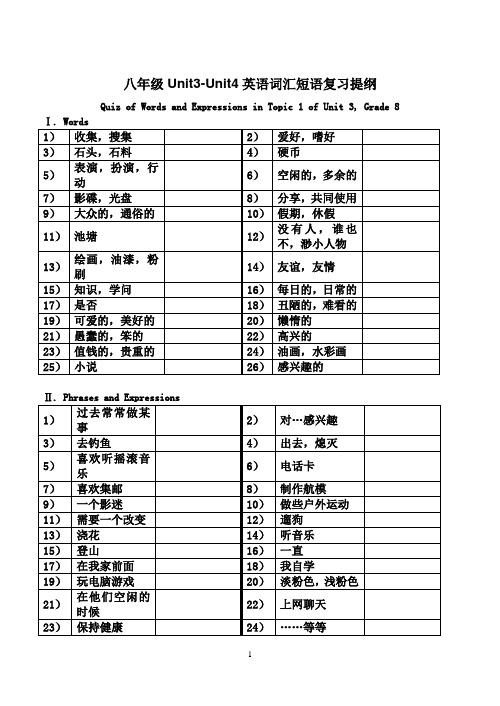八年级英语复习提纲
- 格式:doc
- 大小:34.50 KB
- 文档页数:4


八年级英语复习提纲下面是小编整理的一八年级英语复习提纲,希望对大家有帮助。
八年级英语复习提纲一:Unit 8 How was your school trip?【复习目标】●学会询问和谈论过去发生的事情●了解全班同学的周末活动【语言目标】●What did you do on your school trip?●Did you go to the zoo? No, I didnt. I went to the aquarium.●Were there any sharks?No, there werent any sharks, but there were some really smart seals.【语言结构】●规则动词和不规则动词的一般过去式●一般过去时的肯定句和否定句●Did you....., Were there.....引导的一般疑问句【重点词汇】●aquarium, science center, gift shop,/ seal, shark, octopus●ate, took, hung out, got,/ go for a drive, sleep late, yard sale, day off【应掌握的词组】1. talk about 谈论,talk over谈论2. give a talk 作报告3. have a talk to (with) sb.与某人谈话4. go to the beach去海滩5. have ice cream吃冰淇淋6. go to the zoo去动物园7. go to the aquarium去水族馆8. hang out with ones friends和朋友闲逛9. take photos=take a photo=take pictures=take a picture 照相10. buy a souvenir买纪念品11. have pizza吃比萨饼12. a famous actor著名的演员13. get ones autograph得到了某人的亲笔签名14. win a prize赢得奖品(奖项)15. at the aquarium 在水族馆16. have a great time玩得高兴,过得愉快17. on the school trip在学校的旅游18. Blue Water Aquarium蓝色水族馆19. the Visitors Center游客中心20.a dolphin show海豚表演21. after that 后来22. at the end of在结束的时候,在的尽头23. the Gift Shop礼品店24. at the beginning of在..开始的时候25. a terrible school trip糟糕的学校旅行26. that sounds interesting那听起来很有趣27. make up a story编一个故事28. go for a drive 开车兜风30. in the rain在雨中in the dark在黑暗中\in the sun在阳光下in the snow在雪中31. take notes of=write down=copy down 写下,记下32. have fun doing sth.很快乐的做某事33. play computer games打电脑游戏34. for sale 供销售35. see you soon盼望很快见到你36. in ones opinion据某人看来,某人的观点上看37. win the first prize获得了一等奖38.a famous basketball player著名的篮球运动员39. in the future在将来,今后40. cant help doing sth.忍不住做某事41. the story goes that据说42. a busy day off 繁忙的假日,in ones off hours在某人的休息时间the off season淡季43. none of 当中没有一个44. a heavy rain 一阵大雨a light rain一阵小雨a fine rain 一阵细雨44. all day = all day long 整天all night = all night long整夜【应掌握的句子】1. How was your school trip? 你的学校旅行怎么样?翻译:今天天气怎么样?前天天气怎么样?你的假日怎么样?2. T alk about events in the past.谈谈过去的事件。

八年级上册英语复习提纲(整理)
一、单词复
1. 词汇量
- 综合复所有单元的词汇量,确保熟练掌握
2. 重要单词
- 对于每个单元中的重要单词进行复,包括拼写、发音和词义
二、语法复
1. 时态复
- 复过去时、现在时和将来时的用法和构造
2. 句型复
- 复陈述句、疑问句、否定句等基本句型的构造和用法
三、语言技能训练
1. 听力训练
- 增加听力练的时间和难度,提高听力理解能力
2. 口语训练
- 进行口语练,包括日常对话、自我介绍和简短演讲等
3. 阅读与写作训练
- 阅读英语文章,提高阅读理解能力和写作技巧
四、文化知识研究
1. 英语国家文化
- 研究英语国家的风土人情、传统节日和历史文化知识
2. 跨文化交流
- 研究不同文化背景下的交流方式和惯
五、综合复
1. 整体回顾
- 对每个单元的重点内容进行回顾,确保不遗漏
2. 定期模拟测试
- 参加模拟测试,检验复效果
六、其他建议
- 预下个学期的内容,提前积累知识
以上为八年级上册英语复习提纲,希望能对你的学习有所帮助!。

新目标八年级英语下全册复习提纲Unit 1 Will people have robots?1. in the future 在将来2. live to (be) … years old 活到……岁3. in 100 years =100 years from now 一百年后4. free time 空闲时间be free 免费;自由5. talk about 谈论,谈及,谈到6. high school 高中7. computer programmer 电脑程序员8. on a space station 太空站9. fall in love with … 爱上……10. go skating 去滑冰11. be able to 能,会12. I disagree= I don’t agree我不同意agree with sb. 同意某人的意见13. the World Cup 世界杯14. keep pets 养宠物15. job interview 工作面试16. fly…to… 乘坐…飞往…17. come true 实现,成为现实18. see sb. do sth. 看见某人做了某事see sb doing sth. 看见某人正在做某事19. one’s own … 某人自己的……my own pen 20. science fiction movies 科幻影片21. help (sb.) with sth. 帮助(某人)做某事22. hundreds of 数百,成百上千的23. the same as 和……相同24. wake up 醒来;唤醒26. try to do sth. 试图做某事,尽力做某事27. get bored 变得厌倦28. over and over (again) 一次又一次,再三地29.make predictions 做预测30.predict the future 预测未来31.look for寻找32.the head of ….的老板33.make sb do sth 使某人做某事34.be used by 被用35.less pollution 更少的污染36. live alone 单独居住37.be in different shapes 形状不同38.as a reporter 作为记者39.some...others... 一些……另一些……40.live in an apartment 住在公寓41.dress casually 穿得很随意本单元目标句型:1. What do you think life will be like in 100 years?2. There will be fewer trees、more buildings and less pollution in the future.few(修饰可数名词); less(修饰不可数名词)表示几乎没有,有否定之意,;more二者都可以修饰。

八年级上册英语复习提纲Unit 1: Hello!Vocabulary:•Greetings: hello, hi, good morning, good afternoon, good evening•Introductions: my name is …, nice to meet you, how do you do?•Classroom objects: book, pen, pencil, notebook, ruler, eraser•Numbers: zero, one, two, three, four, five, six, seven, eight, nine, ten•Personal pronouns: I, you, he, she, it, we, they•Verbs: am, is, are, have, has•Question words: what, who, how, where Grammar:•Verb to be: am, is, are (affirmative, negative, and interrogative forms)•Noun plurals: adding -s or -es•Possessive adjectives: my, your, his, her, its, our, their•Present simple tense: affirmative, negative, and interrogative forms•Demonstrative pronouns: this, that, these, those•Wh-questions: what, who, how, where (asking for information)Skills:•Greeting and introducing oneself to others•Describing classroom objects•Expressing possession•Asking and answering questions about people and objects•Giving personal information•Describing daily routinesUnit 2: School LifeVocabulary:•Classroom subjects: English, math, science, history, geography•School facilities: library, laboratory, computer room, playground•School supplies: pencil case, backpack, textbook, notebook•Adjectives to describe school: big, small, old, new, interesting, boring•Daily routines: get up, have breakfast, go to school, have lunch, go home, do homeworkGrammar:•Present simple tense: negative and interrogative forms•Adjectives for describing objects•Adverbs of frequency: always, usually, often, sometimes, rarely, never•Demonstrative pronouns: this, that, these, those (review)•Prepositions of time: in, on, at (for daily routines)•Imperatives: get up, have breakfast, go to school, etc. (giving orders or instructions)Skills:•Talking about school subjects and facilities•Describing school supplies and personal routines•Giving instructions or orders•Talking about frequency of activities•Understanding prepositions of timeUnit 3: Family and FriendsVocabulary:•Family members: mother, father, sister, brother, grandparents, aunt, uncle•Personal characteristics: kind, friendly, funny, smart, talented•Possessions: toys, clothes, shoes, books, bags•Adjectives to describe people: tall, short, thin, fat•Verbs for family activities: eat, drink, play, watch, sing, dance, readGrammar:•Possessive pronouns: mine, yours, his, hers, ours, theirs•Present simple tense: affirmative, negative, and interrogative forms (review)•Adjectives for describing people•Action verbs for activities•Wh-questions: who, what (review)Skills:•Talking about family members and personal characteristics•Describing possessions and appearance•Talking about activities with family and friends•Asking and answering questions about people and objectsUnit 4: Hobbies and InterestsVocabulary:•Hobbies: swimming, cycling, painting, playing soccer, reading, singing, dancing•Musical instruments: guitar, piano, violin, drums•Sports: basketball, baseball, tennis, volleyball, table tennis•Leisure activities: watching movies, playing computer games, shopping, traveling•Adjectives to describe hobbies and interests: fun, interesting, relaxing, excitingGrammar:•Present continuous tense: affirmative, negative, and interrogative forms•Adverbs of manner: carefully, well, quickly, slowly•Comparatives and superlatives: long, longer, longest; good, better, best•Prepositions of place: in, on, at (talking about locations)•Wh-questions: what, who, where, when (review) Skills:•Talking about hobbies and interests•Describing leisure activities•Talking about ongoing actions•Comparing things with superlative and comparative forms•Asking and answering questions about hobbies and interestsUnit 5: My CityVocabulary:•Buildings: school, hospital, library, supermarket, park, restaurant, bank•Places in the city: street, square, bus stop, train station, airport•Directions: turn left, turn right, go straight ahead•Modes of transportation: bus, subway, taxi, bike, car •Adjectives to describe cities: big, small, crowded, peaceful, modern, historicGrammar:•Present continuous tense: negative and interrogative forms (review)•Prepositions of place: in, on, at (review)•Simple future tense: will (affirmative, negative, and interrogative forms)•Imperatives for giving directions: turn left, go straight ahead, etc. (review)•Wh-questions: where, how (for asking about locations and directions)Skills:•Talking about buildings and places in the city•Describing cities and transportation modes•Giving and following directions in a city•Talking about future plans or activities in a city•Asking and answering questions about locations and directions。

初二英语复习提纲复习要点(U8-U14)一、语法:1、一般过去时态。
2、反意疑问句。
3、感叹句。
4、介词in ,on和at的用法。
5、构词法:名词变形容词,形容词变副词。
6、邀请和应答。
请求和许可。
7、一般将来时态。
Will do 和be going to do的区别:二者都可以表示将来的动作或状态,有时可以互换,但又有区别。
表示单纯将来的情况;Tom will visit you next week.或表示带有意愿色彩的将来;Don’t worry, I will help you with your English.或表示客观上必然发生的事;I will be twenty next year.或依据事实做出科学的推测,尤其是天气预报。
The radio says it will be rainy at times.以上情况应用will结构。
如下列句子,不宜用will替换:I am going to see him tomorrow. Tom is going to be a doctor when he grows up. The girl is going to be sick. She looks sad. I think it is going to rain soon.8、掌握一般将来时,现在进行时和一般过去时和一般现在时的区别。
二、知识点归纳:1、 remember记得,反义词为forget【搭配】remember to do sth.记得要做…别忘记要做…(某事没做)not a bit表示“一点也不”;not a little表示“非常”He is not a bit tired. 他一点也不累He is not a little tired.他非常累。
4、 look after…well=take good cake of 好好照顾5、 keep healthy【搭配】keep +形容词,保持某种状态I keep busy all the time.keep sb.+形容词/介词…让某人保持…Please keep the door open.keep doing sth.坚持干某事Don’t keep asking so many questions.keep sb. doing sth.让某人一直干某事Don’t keep me waiting long.keep a diary坚持写日记He keeps a diary every day. keep animals饲养动物Farmers keep animals on the farm.6、 grow up长大成人He wants to be a teacher when he grows up.7、…ago一段时间+指以现在为终点多长时间以前,不能单独使用。
人教版八年级英语上册期末重点复习提纲
一、词汇复
1. 根据课文复重点单词和短语,包括拼写和中英文意思。
2. 运用词汇造句进行巩固练。
二、语法复
1. 复现在进行时、一般现在时、一般过去时的用法。
2. 复被动语态的构成和用法。
3. 复情态动词的用法和意义。
三、听力练
1. 听力练,包括听对话选择正确答案、听短文回答问题等。
2. 使用课本及其他资源进行听力训练。
四、阅读理解
1. 阅读课本中的文章,理解文章的大意和细节。
2. 进行相关的阅读理解题目练。
五、写作练
1. 复书面表达的基本写作技巧,如写作句型和段落结构等。
2. 进行写作练,包括写信、写日记等。
六、口语练
1. 进行口语练,包括对话,描述图片等。
2. 复相关语法和词汇,提高口语表达能力。
七、复技巧和备考方法
1. 总结复经验,制定科学有效的复计划。
2. 尽量多做题,检验自己的掌握程度。
3. 注重练听力和口语,增强应试能力。
以上为人教版八年级英语上册期末重点复习提纲,希望能帮助你对课程内容进行系统复习,取得好成绩。
八年级英语全册复习提纲一、短语1、去…度假_________________________ 度假_______________________2、为考试做准备________________===______________________==_________________________3、照相______________4、玩的开心_______________________=====______________________5、买给某人某物_______________________===______________________6、没事做、有空__________________===_________________==______________________7、好像、似乎___________ It seemed that he was kind== _____________________________________.8、写日记___________________ 9、到达、抵达___________/___________/___________10、骑自行车________________ We went to school by bicycle==We __________ ___________ to school.11、想知道____________==_______ ________ _________12、超过、多于___________==_________ _________ 少于____________13、由于、因为___________ We couldn’t see anything because the weather was badWe couldn’t see anything ________ _______ the _____ ______.14、等待______ We _____ _____ the bus yesterday. We _____ ____ the bus stop yesterday.15、忘记做过某事________________________ 忘记要做某事________________________16、又两个小时_____________________===__________________________17、在网上_________________ 英特网的使用________________ 使用英特网___________18、吃早餐____________________ 吃一顿健康的早餐_______________________19、对。
Unit1 where did you go on vacation?1.必须熟记常见的特殊动词过去式见课本142,143页2.重点短语:go on vacation去度假be on vacation 度假stay at home待在家里go to the mountains去爬山go to the beach去海滩visit museums 参观博物馆go to summer camp去参观夏令营quite a few相当多study for为……而学习go out出去most of the time大部分时间taste good尝起来很好吃have a good time玩得高兴of course当然feel like给……的感觉;感受到feel like doing sthgo shopping去购物in the past在过去walk around四处走走because of因为one bowl of… 一碗……the next day第二天drink tea喝茶find out找出;查明go on继续take photos照相something important重要的事up and down上上下下come up出来buy sth. for sb. / buy sb. sth.为某人买某物taste + adj. 尝起来…look+adj. 看起来…smell 闻起来sound 听起来feel 感觉起来taste delicious…look beautiful…smell terrible …sound wonderful… feel comfortable /tired / bored/nothing…but+动词原形除了……之外什么都没有seem+(to be)+ adj. 看起来…… No one seemed to be bored.seem to do sth.arrive in+大地点/ arrive at+小地点到达某地decide to do sth.决定去做某事try doing sth.尝试做某事/ try to do sth.尽力去做某事forget doing sth.忘记做过某事/ forget to do sth.忘记做某事enjoy doing sth.喜欢做某事dislike doing sth. 不喜欢做某事want to do sth.想去做某事start doing sth.开始做某事stop doing sth. 停止做某事stop to do sth. 停下来去做某事keep doing sth.继续做某事keep on doing sth. 反复做某事有小停歇Why not do. sth.?为什么不做……呢?so+adj.+that+从句如此……以至于……it is + adj. + for sb. +to do sth对某人来说做…怎么样tell sb. (not) to do sth. 告诉某人(不要)做某事ask sb. (not) to do sth. 要求某人(不要)做某事want sb. (not) to do sth. 想要某人(不要)做某事anywhere 与somewhere 两者都是不定副词。
八年级2023英语复习提纲总结将英语书的内容简洁地粗读一遍,对不熟悉的生词反复阅读儿遍,记住它究竟由哪几个字母组成,以便增加印象,日后再屡次遇到它时,自然就会熟悉了。
下面是我为大家整理的有关八年级英语复习提纲,期望对你们有帮忙!八年级英语复习提纲(1)1.watch out = be careful = look out = take care当心,当心,留意3.would like to do sth.想要做某事= feel like doing sth. = want to do sth.4.the dinning room餐厅5.make friends (with)(和……)交朋友6.see sb. doing sth.观察某人在做某事see sb. do sth.观察某人做了某事7.make predictions做猜测8.hope to do sth.期望做某事= wish to do sth.9.In order to为了八年级英语复习提纲(2)1. How long have you been skating?你滑冰有多长时间了?2. I’ve been skating since nine o’clock./since I was four years old.我从九点始终滑到现在/我从四岁始终滑到现在。
3. I’ve been skating for five hours.我始终滑了五小时。
4. Alison was the first one to start and has been skating for the whole five hours.Alison是第一个开头并且已经滑了整整5个小时。
5. For every hour they skate, each student raises ten yuan for charity.每滑一个小时,每位同学可为慈善事业筹集10元钱。
Unit2复习提纲1.Howoftendoyouexercise?→Howoften+助动词do(does或did)+主语+dosth.?疑问词howoften是问频率(多经常),在这里助动词do(does或did)是起帮助构成疑问的作用Everyday/Onceaweek/Twiceamonth/Threetimesamonth/Threeorfourtimesamonth.2.Whatdoyouusuallydoonweekends?第一个do为助动词,在这起帮助构成疑问的作用;而第二个do则是实义动词。
Iusuallyplaysoccer.3.What’syourfavoriteprogram?It’sAnimalWorld.4.WhatdostudentsdoatGreenHighSchool?第一个do为助动词,在这起帮助构成疑问的作用;而第二个do则是实义动词。
5.Asforhomework,moststudentsdohomeworkeveryday.asfor...意思是“至于;关于”,常用于句首作状语,其后跟名词、代词或动词的-ing形式(即动名词)。
如:Asforhim,Ineverwanttoseehimhere.至于他,我永远不希望在这里见到。
Asforthestory,you'dbetternotbelieveit.关于那故事,你最好不要相信。
6.Theresultsfor“watchTV”areinteresting.7.Momwantsmetogetupat6:00andplayping-pongwithher.→wanttodosth.意思是“想要做某事”;wantsb.todosth.意思是“想要某人做某事”。
如:Doyouwanttogotothemovieswithme?你想和我一起去看电影吗?Theteacherdoesn'twantustoeathamburgers.老师不想让我们吃汉堡包。
8.Shesaysit’sgoodformyhealth.→begoodfor...表示“对……有益(有好处)”。
其反义为:bebadfor...。
(这里for是介词,后跟名词、代词或动名词)如:It'sgoodforustodomorereading.多读书对我们有好处。
Readinginbedisbadforyoureyes.在床上读书对你的眼睛有害。
9.Howmanyhoursdoyousleepeverynight?10.Iexerciseeveryday,usuallywhenIcomehomefromschool.11.Myeatinghabitsareprettygood.这里pretty相当于very。
12.Itrytoeatalotofvegetables,usuallytentoeleventimesaweek.→trytodosth.表示“尽力做某事”,不包含是否成功的意思/trydoingsth.表示“(用某一办法)试着去做某事”。
如:You’dbettertrydoingtheexperimentinanotherway.你最好试试用另一种方法做这个试验。
13.Myhealthylifestylehelpsmegetgoodgrades.→helpsb.(to)dosth.帮助某人做某事14.Goodfoodandexercisehelpmetostudybetter.→helpsb.(to)dosth.帮助某人做某事/这里better是well的比较级,而不是good的比较级15.Isherlifestylethesameasyoursordifferent?=Isherlifestylethesameasyourlifestyleorisherlifestyledifferentfromyourlifestyle?→bethesameas…/bedifferentfrom…16.IthinkI’mkindofunhealthy.kindof=alittle/akindof意思是“一种”17.Whatsportsdoyouplay?18.Alotofvegetableshelpyoutokeepingoodhealth.keepingoodhealth=keephealthy=stayhealthy19.Youmusttrytoeatlessmeat.→trytodosth.表示“尽力做某事”,不包含是否成功的意思/less是little的比较级20.Thatsoundsinteresting.这是“主语+系动词+表语”结构的简单句。
sound(听起来),look (看起来),smell(闻起来),taste(尝起来),feel(觉得),seem(好象),grow(变得),get (变得)等词在英语中可用作系动词,后跟形容词作表语。
如:Ittastesgood.这味道好。
Themusicsoundsverysweet.这音乐听起来很入耳。
Thesmokegrewheavierandheavier.烟雾变得越来越浓了。
UnitTwo1.What’sthematter?What’sthematerwithyou?with为介词,后跟名词、代词或动名词。
人称代词必须用它的宾格。
Ihaveacold/haveasoreback/haveastomachache2.Youshouldliedownandrest/drinkhotteawithhoney/seeadentist/seeadoctor.3.I’mnotfellingwell.这里well表示身体状况,不能用good代替4.Whendiditstart?Abouttwodaysago.5.That’stoobad.6.Ihopeyoufellbettersoon.这里better是well的比较级7.TraditionalChinesedoctorsbelieveweneedabalanceofyinandyangtobehealthy.这里tobehealthy是动词不定式短语,作目的状语8.Maybeyouhavetoomuchyin.toomuch后跟不可数名词,而toomany后跟可数名词复数9.It’seasytohaveahealthylifestyle,andit’simportanttoeatabalanceddiet.→It’seasytodosth.做某事容易/I t’simportanttodosth.做某事重要10.Everyonegetstiredsometimes.这里get连系动词,tired是形容词作表语,属系表结构11.Asorethroatcangiveyouafever.→givesb.sth.=givesth.tosb.把某物给某人12.Don’tgetstressedout.It’snothealthy.在这里get是连系动词,stressedout是表语13.Ihaveatoothache.Ineedtoseeadent ist.→need意思为“需要”,作实义动词时,后跟动词不定式,否定式为don’t/doesn’t/didn’tneed(todosth.);作情态动词时,只能用于否定句或疑问句中,否定式为needn’t(dosth.),除有过去式外,没有其它的形态变化14.Eatabalanceddiettostayhealthy.tostayhealthy是动词不定式短语,作目的状语15.I’mnotfeelingverywellatthemoment.atthemoment=nowUnitThree1.Whatareyoudoingforvacation?I’mbabysittingmysister.Whereareyougoingforvacation?Italy.这是现在进行时的一种比较特殊的用法,用来表示按计划或安排要做的事情,现在还没有去做。
2.Whoareyougoingwith?I’mgoingwithmyparents.withmyparents是介词短语,在这里作伴随状语,起修饰谓语动词aregoing的作用3.Whenareyougoing?I’mgoing onMonday.4.Whatareyoudoingthere?I’mgoinghikinginthemountains.5.Howlongareyoustaying?Justforfourdays.Idon’tlikegoingawayfortoolong.疑问词hwolong是对时间长短或事物的长度提问,在这里是对时间的长短进行提问。
6.Haveagoodtime.=Enjoyoneself.玩得开心、愉快7.Showmeyourphotoswhenwegetbacktoscho ol.→showsb.sth.=showsth.tosb.把某给某人看8.I’mgoingtoHawaiiforvacation.forvacation是介词短语,在这里作目的状语,起修饰谓语动词的作用9.What’sitlikethere?这里like是介词,而不是动词10.CanIaskyousomequestionsaboutyourvacationplans?→asksb.sth.问某人某事11.BenLambert,thefamousFrenchsinger,istakin galongvacationthissummer!→takeavacation度假12.HethoughtaboutgoingtoGreeceorSpain,butdecidedonCanada.→thinkabout考虑/decideon决定这里的about和on都是介词13.“IalwaystakevacationinEurope,”hesaid.“ThistimeIwanttodosomethingdifferent.”→(1).wanttodosth.(2).修饰不定代词(something,nothing,anything等)的定语常放在不定代词的后面14.Heplanstohaveaveryrelaxingvacation.→plantodosth.计划做某事15.I’mplanningtospendtimeinthebeautifulcountryside.16.Ijustfinishedmakingmylastmovies.→finishdoingsth.完成做某事17.IhearthatThailandisagoodplacetogosightseeing.togosightseeing是动词不定式短语,作agoodplace的后置定语18.She’sleavingforHongKongonTuesday.→leaveAforB离开A地去B地19.IwanttoaskyouaboutplacestovisitChina.tovisitChina是动词不定式短语,作places的后置定语20.I’mplanningmyvacationtoItalythisweekend.toItaly是动词不定式短语,作myvacation的后置定语21.Whatshouldtouriststakewiththem?withthem是介词短语,在这里作伴随状语,起修饰谓语动词take的作用22.Whereareyouleavingfrom?leavefrom离开某地(注:from是介词)UnitFour1.Howdoyougettoschool?疑问词how在这里是对方式进行提问Iridemybike/walk/takethesubway.Bybike/bicycle/bus/train/subway/taxi/air/plane/ship/boat.Onfoot.HowdoIgetthere?因there是副词,所以不能说gettothereDon’tworry.Letmelookatyourmap.Ok,first…,next….Then….2.Howlongdoesittake?疑问词hwolong是对时间长短或事物的长度提问Ittakesabout25minutestowalkand10minutesbybus.Howlongdoesttakeyoutogetfromhometoschool?Ittakestwenty-fiveminutes.→takesb.sometimetodosth.花费某人……时间做某事3.LinFei’shomeisaboutKilometersfromschool.4.Howfarisitfromyourhometoschool?It’sthreemiles.Howfardoyoulivefromschool?Ilive10milesfromschool.疑问词howfar在这里是对距离进行提问5.Inotherpartsoftheworld,thingsaredifferent.6.InChina,itdependsonwhereyouare.→dependon视……而定;决定于7.Thatmustbealotmorefunthantakingabus.8.InNorthAmerica,notallstudentstakethebustoschool.notall是部分否定,意思是并不是所有的;不是全部的9.OtherpartsoftheworldaredifferentfromtheUnitedStates.10.Asmallnumberofstudentstakethesubway.→anumberof=many许多11.Whatdoyouthinkofthetransportationinyourtown?→thinkof对……有某种看法12.WhenitrainsItakeataxi.13.IhaveamapbutinChinese.14.Ifyouhaveaproblem,youcanaskapoliceman.UnitFive1.Canyoucometomyparty?Sure,I’dlove(like)to./I’msorry,Ican’t.Ihavetohelpmyparents.Canyouplaytenniswithme?情态动词can在这里起征求对方意见的作用。